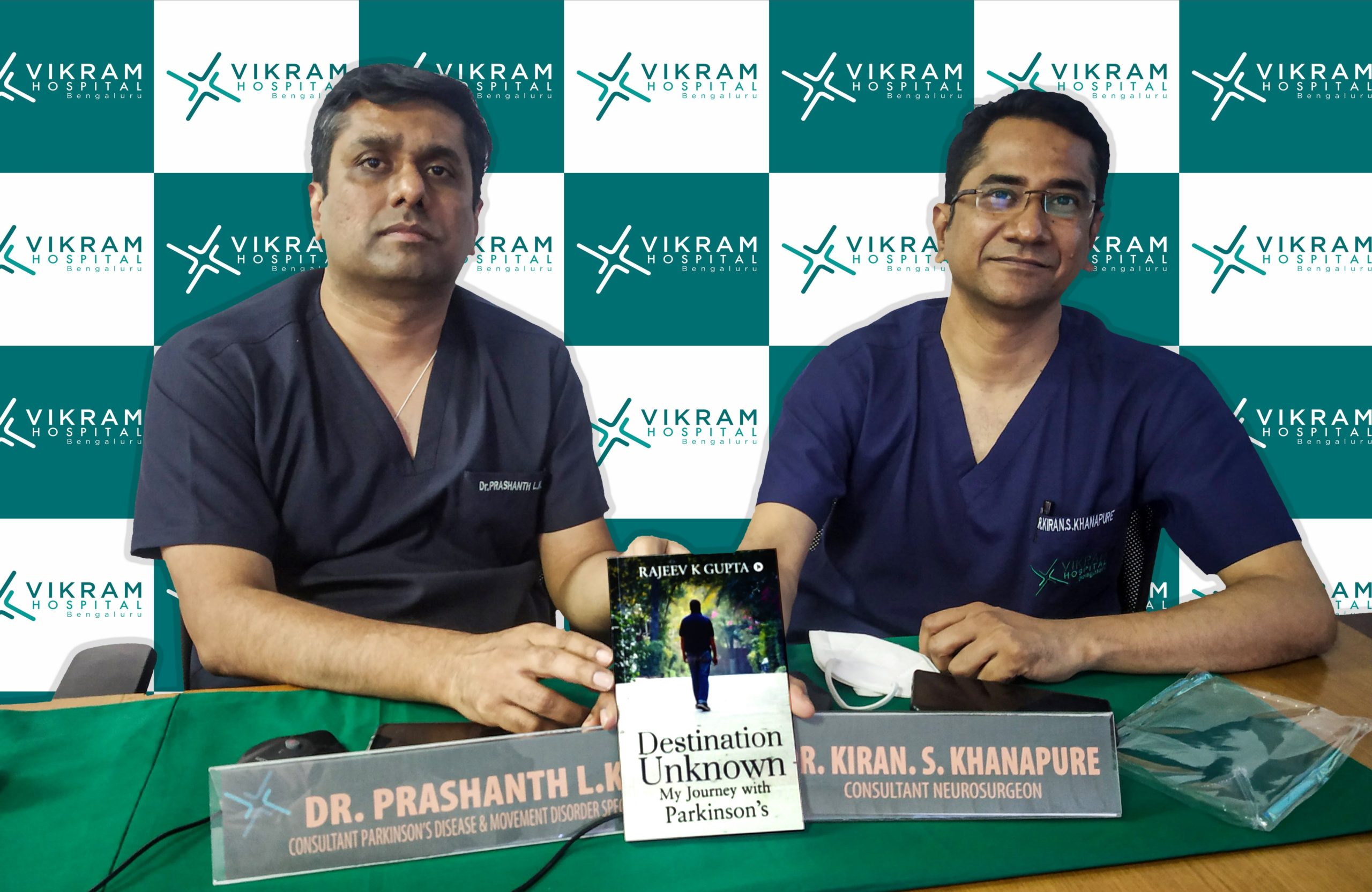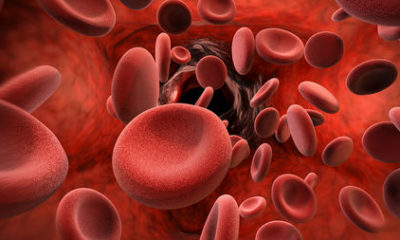Medical & Pharma
Vikram Hospital Doctors: Increasing number of people below 40 showing symptoms of Parkinson’s

BENGALURU / April 8, 2021: The incidence of Parkinson’s Disease (PD) is rising across India with increasing life expectancy, and Karnataka is no different.
The prevalence of PD is 300-350 persons per lakh population in the country, making it one of the most common ageing-related disorders. While no specific numbers are available for Karnataka, the state government had in the last census specifically asked the question of whether anyone in the family is suffering from PD, highlighting its increasing incidence and recognition as a brain disorder requiring attention. This was said by doctors of Vikram Hospital at an event in the run-up to World Parkinson’s Disease Day.
Rajeev K Gupta, celebrated author of the book “Destination Unknown – My Journey with Parkinson’s,” narrated his story and struggle of living with this progressive disease. A 59-year-old Bengaluru resident, he was diagnosed with Parkinson’s in 2013 when he was 51. The book is about emotionally and physically coping with a life-altering illness narrated through his personal stories and experiences of living with Parkinson’s.
Dr. Prashanth LK, Consultant Neurologist and Parkinson’s Disease & Movement Disorder Specialist, Vikram Hospital, Bengaluru, said “Of late, more and more people in younger age groups of less than 40 years are showing symptoms of Parkinson’s which is significantly impacting their personal and family life. The reason could be multifactorial, including genetics, stress factor, poor quality of life, etc. The exact causes of Parkinson’s remain unclear. Genetics as a cause has been acknowledged in some patients. Research is being carried out to understand the genetics of Indian PD patients. This is important because most global studies currently relate to only Europeans and Americans. Vikram hospital is one of the leaders in the multicentric pan-Indian Parkinson’s disease research along with AIIMS, NIMHANS, Centre for Brain Research, IISc, Centre for Cellular and Molecular biology. Vikram Hospital has been one of the pioneer hospitals in India for the initiation of Apomorphine pump therapies”
Dr. Kiran S Khanapure, Consultant Functional Neurosurgeon, Vikram Hospital, added further “Covid and the ensuing lockdown had a significant effect on patients of PD and Parkinsonism. It led to many of them developing behavioural changes in the form of anxiety, depression, and hallucinations, along with sleep disturbances and worsening of symptoms. Quite a few of them were unable to access regular medications or meet the doctors, adding to their problems. Parkinson’s Disease is an ageing-related disorder and has good treatment options, including tablets, injections, pump therapies, and surgeries (DBS and lesioning). No curative option is available yet, but research like gene-based therapy and modification of underlying pathophysiology may see the light of the day in the near future.”
Talking about his book, Rajeev K Gupta said: “After my diagnosis, I wanted to read about the experiences of other patients and how they coped with this life-changing illness. There are many books written by Parkinson’s patients and their care partners – all by Western authors. I could not find a single book from an Indian perspective. Through my experience of medical therapies and Deep Brain Stimulation (DBS) surgery, it occurred to me that I should pen down my own story and experiences rather than wait for someone else to write theirs. This is perhaps the first book on the Parkinson’s journey of an Indian patient. I hope it will inspire some other patients to open up and share their experiences.”
He added: “Parkinson’s patients should not blame themselves for the disease. It is believed to be caused by a number of complex environmental and genetic factors not yet fully known. The main challenges facing patients in India is that limited experts such as Movement Disorder Specialists, Physiotherapists trained to treat PD cases, and speech therapists are available only in big cities. Some procedures like DBS are too costly and out of reach for many patients. There is also a lack of financial and caregiving support.”
Rajeev K Gupta said: “Though an active life helps maintain general health, PD is not a lifestyle-related disease. Though there is no cure for Parkinson’s yet, it is a slowly progressing disorder and patients can manage it and lead a near-normal life for many years. Finding the right doctor is half the battle won. Even if patients have to travel some distance, they should go to a specialist who they trust. They should not focus on the worst-case scenarios. The journey of each of them is different and so is their destination.”
Giving suggestions on how people and society can better deal with Parkinson’s patients and make their life easier, Rajeev K Gupta said: “People should have some basic minimum awareness about Parkinson’s. They should remember that despite their blank expressions and slow, awkward movements, most PD patients have their cognitive abilities intact. We are as sharp as ever. Do not treat us as dull-witted. Do not pity us or sympathize with us. Rather accept and socialize with us. Managing our own tasks is important for our self-esteem and independence. We do not expect you to offer help to us but rather be patient with us if we are taking more time to accomplish the task.”
“Vikram hospital is one of the leading centres in India participating in research programs on Indian patients of Parkinson’s. These include projects like Genetics of Young Onset Parkinson’s Disease and genome-wide association studies on Parkinson’s disease (funded by Michael J Fox Foundation as a part to understand the genetic architecture of under-represented communities). There is also a consortium of Movement disorders specialists working in India under the banner of Parkinson’s Research Alliance of India (PRAI) which is looking forward to any form of technical, clinical, or funding collaborations to get to understand the Indian Parkinson’s disease patients” said Dr Somesh Mittal, MD & CEO Vikram Hospital Bengaluru.
About Vikram Hospital:
Vikram Hospital Bengaluru is quaternary care, multi-speciality hospital. It provides high-quality care in all clinical disciplines and has outstanding capabilities in Cardiology, Cardiac Surgery, Neurology, Neuro Surgery, Stroke and Epilepsy, Orthopaedic and Trauma Care, Spine Surgery, Bariatric and Metabolic Surgery, Gastroenterology and Hepatobiliary, Nephrology, Urology, Critical Care, Pulmonology, Endocrinology, Maxillofacial, ENT, Plastic Surgery, Medical and Surgical Oncology, Gynaecology, Cosmetology, Dental and Dermatology. Vikram Hospital’s world-class medical care and expertise have delivered excellent clinical outcomes. The hospital offers comprehensive services in a compassionate and caring environment.
For more information, please visit www.vikramhospital.com.
MEDIA RELEASE









































